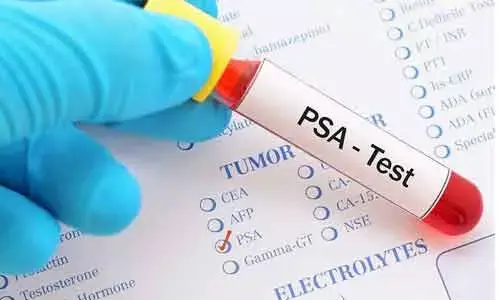- Home
- Medical news & Guidelines
- Anesthesiology
- Cardiology and CTVS
- Critical Care
- Dentistry
- Dermatology
- Diabetes and Endocrinology
- ENT
- Gastroenterology
- Medicine
- Nephrology
- Neurology
- Obstretics-Gynaecology
- Oncology
- Ophthalmology
- Orthopaedics
- Pediatrics-Neonatology
- Psychiatry
- Pulmonology
- Radiology
- Surgery
- Urology
- Laboratory Medicine
- Diet
- Nursing
- Paramedical
- Physiotherapy
- Health news
- Fact Check
- Bone Health Fact Check
- Brain Health Fact Check
- Cancer Related Fact Check
- Child Care Fact Check
- Dental and oral health fact check
- Diabetes and metabolic health fact check
- Diet and Nutrition Fact Check
- Eye and ENT Care Fact Check
- Fitness fact check
- Gut health fact check
- Heart health fact check
- Kidney health fact check
- Medical education fact check
- Men's health fact check
- Respiratory fact check
- Skin and hair care fact check
- Vaccine and Immunization fact check
- Women's health fact check
- AYUSH
- State News
- Andaman and Nicobar Islands
- Andhra Pradesh
- Arunachal Pradesh
- Assam
- Bihar
- Chandigarh
- Chattisgarh
- Dadra and Nagar Haveli
- Daman and Diu
- Delhi
- Goa
- Gujarat
- Haryana
- Himachal Pradesh
- Jammu & Kashmir
- Jharkhand
- Karnataka
- Kerala
- Ladakh
- Lakshadweep
- Madhya Pradesh
- Maharashtra
- Manipur
- Meghalaya
- Mizoram
- Nagaland
- Odisha
- Puducherry
- Punjab
- Rajasthan
- Sikkim
- Tamil Nadu
- Telangana
- Tripura
- Uttar Pradesh
- Uttrakhand
- West Bengal
- Medical Education
- Industry
Baseline PSA levels can determine long-term prostate cancer risk in middle-aged men: JAMA

USA: Baseline PSA (prostate-specific antigen) levels among men aged 55 to 60 years is associated with long-term risk of clinically significant prostate cancer, finds a recent study published in the journal JAMA Network Open. According to the study, repeated screening can be less frequent among men aged 55 to 60 years with a low baseline PSA level (ie, <2.00 ng/mL) and possibly discontinued among those with baseline PSA levels of less than 1.00 ng/mL.
The findings suggest that future prostate cancer screening among such men should be individually tailored based on the baseline PSA levels to reduce the risk of overtreatment and overdiagnosis of indolent cancers. The findings are based on secondary analysis of a cohort in the Prostate, Lung, Colorectal, and Ovarian (PLCO) Cancer Screening Trial.
Widespread PSA screening, since its introduction in early 1990s for the diagnosis and treatment of prostate cancer, has led to a 50% reduction in prostate cancer-specific mortality. However, opinions on the utility of screening have shifted in recent years, and there is now controversy surrounding its use as a screening tool because of the overdiagnosis and overtreatment of indolent cancers.
Evan Kovac, Glickman Urological and Kidney Institute, Cleveland Clinic Foundation, Cleveland, Ohio, and colleagues performed this secondary analysis to estimate the long-term risk of any prostate cancer and clinically significant prostate cancer based on baseline PSA levels among men aged 55 to 60 years.
The study involved 10 968 men aged 55 to 60 years enrolled in the PCLO trial. examined data from the PLCO trial involving more than 76,000 men aged 55 to 74 years. Their analysis was limited to the nearly 11,000 patients aged 55 to 60 years at study enrollment between 1993 to 2001. All had received at least one PSA test.
As Dr. Evan Kovac told Reuters Health by email, "Our study of over 10,000 younger men (aged 55-60) enrolled in the Prostate, Lung, Colorectal and Ovarian (PLCO) randomized screening trial found that a single PSA blood test, taken in mid-life, predicts the long-term diagnosis of important prostate cancer."
Primary outcomes included long-term risk of any prostate cancer and clinically significant prostate cancer diagnoses.
Key findings of the study include:
- Actuarial 13-year incidences of clinically significant prostate cancer diagnosis among participants with a baseline PSA of 0.49 ng/mL or less was 0.4%; 0.50-0.99 ng/mL, 1.5%; 1.00-1.99 ng/mL, 5.4%; 2.00-2.99 ng/mL, 10.6%; 3.00-3.99 ng/mL, 15.3%; and 4.00 ng/mL and greater, 29.5%.
- Only 15 prostate cancer–specific deaths occurred during 13 years of follow-up, and 9 (60.0%) were among men with a baseline PSA level of 2.00 ng/mL or higher.
"To our knowledge, our analysis of baseline PSA in men aged 55 to 60 years who were enrolled in the screening group of the PLCO Cancer Screening Trial represents the largest analysis of its kind to date," wrote the authors.
"Our results support the modification of future screening practices based on baseline PSA level and could help to reduce the need for prostate biopsy and overdetection of clinically indolent PCa without significantly compromising oncologic outcomes," they concluded.
The study, "Association of Baseline Prostate-Specific Antigen Level With Long-term Diagnosis of Clinically Significant Prostate Cancer Among Patients Aged 55 to 60 Years: A Secondary Analysis of a Cohort in the Prostate, Lung, Colorectal, and Ovarian (PLCO) Cancer Screening Trial," is published in the journal JAMA Network Open.
Dr Kamal Kant Kohli-MBBS, DTCD- a chest specialist with more than 30 years of practice and a flair for writing clinical articles, Dr Kamal Kant Kohli joined Medical Dialogues as a Chief Editor of Medical News. Besides writing articles, as an editor, he proofreads and verifies all the medical content published on Medical Dialogues including those coming from journals, studies,medical conferences,guidelines etc. Email: drkohli@medicaldialogues.in. Contact no. 011-43720751


